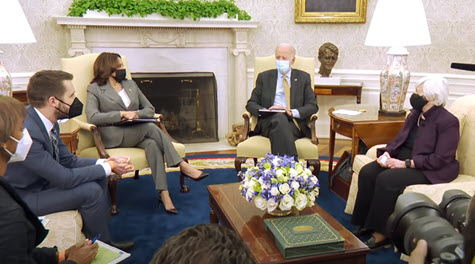Federal Reserve Bank of Dallas President and CEO Robert S. Kaplan, top left in photo, on April 12 discussed a wide range of monetary and fiscal policy issues with Roundtable Chairman Emeritus Robert S. Taubman (Chairman & CEO, Taubman Centers, Inc.), top right, and Roundtable President and CEO Jeffrey DeBoer, center. (Watch the Kaplan video interview on The Roundtable’s YouTube Channel)
The Fed View
- The remote discussion focused on the overall economy, inflation trends, affordable housing, commercial real estate, the banking industry and cryptocurrency. Among Mr. Kaplan’s key points:
- The Dallas Fed forecast for the 2021 U.S. economy’s growth rate is 6.5 percent.
- The distribution of COVID-19 vaccines is outpacing the spread of the virus, positively affecting economic growth.
- A recovering economy follows improved health conditions, with expected increases in consumer mobility and spending.
- A significant element driving the economic recovery is “Substantial fiscal policy, much more substantial as a percentage of GDP than we had during the Great Recession.”
- Kaplan acknowledged the challenge of balancing central bank monetary policies with fiscal policies enacted by lawmakers. “Anytime there’s fiscal actions or other changes, you have to keep recalibrating that balance. There’s no textbook for this because we haven’t been through a period where we were shut down and we’re now reopening … and there’s no precedent in recent years of fiscal policy that’s this size of GDP,” Kaplan said. (Video of the discussion)
- He commented about the yield on U.S. Treasuries, which rose to 1.77% last month. “As we recover, it wouldn’t surprise me for it to drift higher, the 10 year,” Kaplan said, adding, “There’s no shortage of capital” to buy Treasuries. (BGov, April 9)
- Kaplan also addressed the economic trends monitored by the Dallas Fed, reopening progress and CRE debt exposure to banks.
Pandemic Relief Funds & Distribution

- Significant fiscal policy enacted by Washington lawmakers last month authorized hundreds of billions in pandemic relief under the American Rescue Plan Act of 2021 to households, small businesses, and the hospitality industry suffering from the economic impact of COVID-19. (Roundtable Weekly, March 12, 2021)
- The Wall Street Journal reported on April 13 that state and local authorities are overwhelmed with “how to allocate $25 billion in federal rental relief, leaving many tenants and landlords waiting weeks or months for their share.”
- The Roundtable is part of a broad real estate coalition that wrote on April 15 to state, county and municipal officials, urging them to distribute the allocated federal funds as soon as possible. (Coalition letter)
- The coalition letter emphasized the need for elected state and local leaders “to quickly and fully allocate available American Rescue Plan federal funds to provide assistance to renters, consumer-facing small businesses, and impacted industries such as retail, tourism, travel, and hospitality that are having trouble paying rents, mortgages or remaining viable enterprises due to the COVID-19 pandemic.”
- The letter adds, “Such assistance would make a big difference in the lives of thousands upon thousands of COVID-19 affected renters and businesses in their cities, counties, and states – and would also provide stability to the buildings and communities in which they live.”
The Treasury Department continues to implement pandemic recovery programs, including the State and Local Fiscal Recovery Fund, State Small Business Credit Initiative, and renter and homeowner assistance. Treasury Secretary Yellen and White House Rescue Plan Coordinator Gene Sperling met yesterday with members of the National Governor’s Association Executive Committee to determine the most efficient and effective way to get federal resources to states. (Treasury Dept readout, April 15)
# # #






















